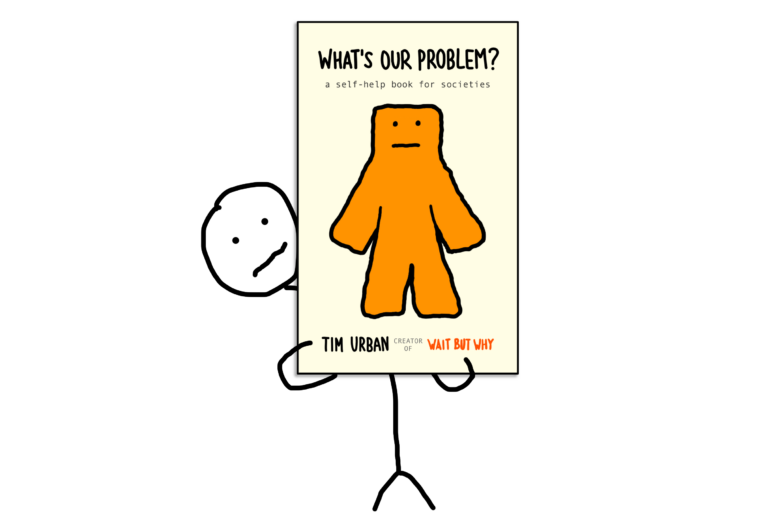Say hi to Lucy.
跟露西打聲招呼。

Lucy is part of Generation Y, the generation born between the late 1970s and the mid 1990s. She’s also part of a yuppie culture that makes up a large portion of Gen Y.
露西是 Y 世代的一員,這一代人出生於 1970 年代末至 1990 年代中期。她同時也是雅皮士文化的一部分,這種文化在 Y 世代中佔據了很大一部分。
I have a term for yuppies in the Gen Y age group—I call them Gen Y Protagonists & Special Yuppies, or GYPSYs. A GYPSY is a unique brand of yuppie, one who thinks they are the main character of a very special story.
我對千禧世代的雅痞有一個稱呼——我稱他們為千禧世代主角和特別雅痞,簡稱 GYPSYs。GYPSY 是一種獨特的雅痞,他們認為自己是某個非常特別故事的主角。
So Lucy’s enjoying her GYPSY life, and she’s very pleased to be Lucy. Only issue is this one thing:
所以露西正在享受她的吉普賽生活,對於自己是露西感到非常高興。唯一的問題是這一點:
Lucy’s kind of unhappy.
露西有些不快樂。
To get to the bottom of why, we need to define what makes someone happy or unhappy in the first place. It comes down to a simple formula:
要弄清楚原因,我們首先需要定義什麼讓人感到快樂或不快樂。這可以歸結為一個簡單的公式:

It’s pretty straightforward—when the reality of someone’s life is better than they had expected, they’re happy. When reality turns out to be worse than the expectations, they’re unhappy.
這很簡單——當一個人的生活現實超出他們的預期時,他們會感到快樂;而當現實比預期更糟時,他們則會感到不快樂。
To provide some context, let’s start by bringing Lucy’s parents into the discussion:
為了提供一些背景,我們先來討論露西的父母:

Lucy’s parents were born in the 50s—they’re Baby Boomers. They were raised by Lucy’s grandparents, members of the G.I. Generation, or “the Greatest Generation,” who grew up during the Great Depression and fought in World War II, and were most definitely not GYPSYs.
露西的父母出生於 50 年代——他們是嬰兒潮一代。他們由露西的祖父母撫養長大,祖父母屬於 G.I.一代,或稱“最偉大的一代”,在大蕭條時期成長,並參加了第二次世界大戰,絕對不是吉普賽人。

Lucy’s Depression Era grandparents were obsessed with economic security and raised her parents to build practical, secure careers. They wanted her parents’ careers to have greener grass than their own, and Lucy’s parents were brought up to envision a prosperous and stable career for themselves. Something like this:
露西的祖父母在經濟大蕭條時期對經濟安全非常重視,並教育她的父母建立實用且穩定的職業。他們希望她父母的職業能比他們自己的更為美好,因此露西的父母被培養成能夠想像一個繁榮而穩定的職業。大致上是這樣:

They were taught that there was nothing stopping them from getting to that lush, green lawn of a career, but that they’d need to put in years of hard work to make it happen.
他們被告知,沒有什麼能阻止他們達到那片郁郁蔥蔥的職業生涯,但他們需要付出多年的辛勤努力才能實現這個目標。
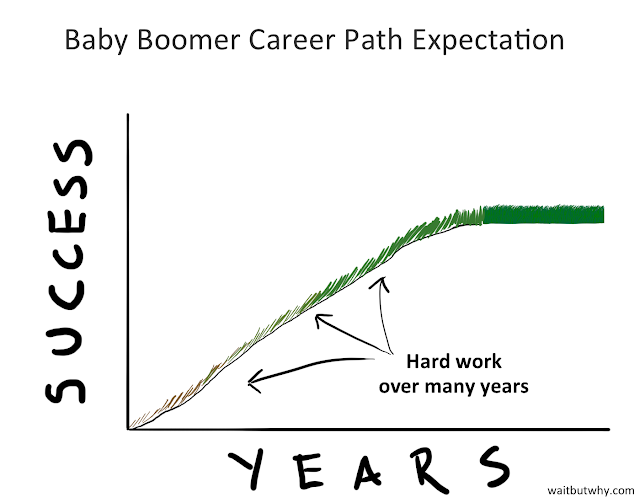
After graduating from being insufferable hippies, Lucy’s parents embarked on their careers. As the 70s, 80s, and 90s rolled along, the world entered a time of unprecedented economic prosperity. Lucy’s parents did even better than they expected to. This left them feeling gratified and optimistic.
在從無法忍受的嬉皮士生活中畢業後,露西的父母開始了他們的職業生涯。隨著 70 年代、80 年代和 90 年代的到來,世界進入了一個前所未有的經濟繁榮時期。露西的父母的成就超出了他們的預期,這讓他們感到非常滿足和樂觀。
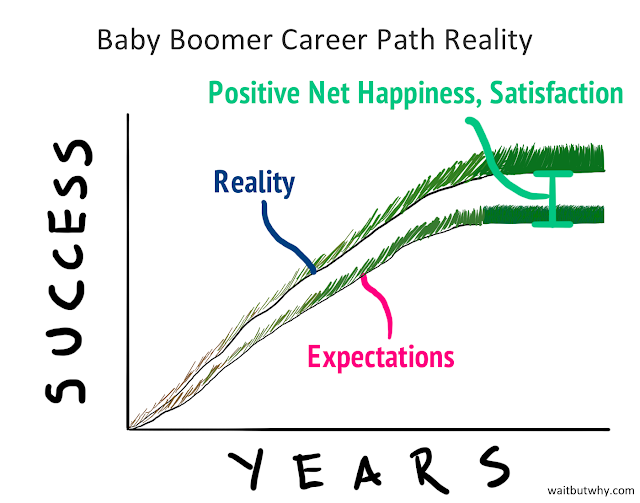
With a smoother, more positive life experience than that of their own parents, Lucy’s parents raised Lucy with a sense of optimism and unbounded possibility. And they weren’t alone. Baby Boomers all around the country and world told their Gen Y kids that they could be whatever they wanted to be, instilling the special protagonist identity deep within their psyches.
與他們自己的父母相比,露西的父母擁有更順暢、更積極的生活體驗。他們以樂觀和無限的可能性來培養露西。而且他們並不孤單。全國及全球的嬰兒潮一代告訴他們的 Y 世代孩子,無論他們想成為什麼,都可以實現,將這種特殊的主角身份深深植入他們的心靈中。
This left GYPSYs feeling tremendously hopeful about their careers, to the point where their parents’ goals of a green lawn of secure prosperity didn’t really do it for them. A GYPSY-worthy lawn has flowers.
這讓吉普賽人對自己的職業充滿了希望,以至於他們父母對安全繁榮的綠色草坪的期望對他們來說並不重要。一個吉普賽人理想中的草坪上應該有花朵。

This leads to our first fact about GYPSYs:
這是我們關於吉普賽人的第一個事實:
GYPSYs Are Wildly Ambitious
吉普賽人充滿了野心

The GYPSY needs a lot more from a career than a nice green lawn of prosperity and security. The fact is, a green lawn isn’t quite exceptional or unique enough for a GYPSY. Where the Baby Boomers wanted to live The American Dream, GYPSYs want to live Their Own Personal Dream.
吉普賽人對事業的需求遠不止於一片繁榮與安全的綠草坪。事實上,對於吉普賽人來說,綠草坪並不算特別或獨特。嬰兒潮一代追求的是美國夢,而吉普賽人則渴望實現他們自己的個人夢想。
Cal Newport points out that “follow your passion” is a catchphrase that has only gotten going in the last 20 years, according to Google’s Ngram viewer, a tool that shows how prominently a given phrase appears in English print over any period of time. The same Ngram viewer shows that the phrase “a secure career” has gone out of style, just as the phrase “a fulfilling career” has gotten hot.
卡爾·紐波特指出,“追隨你的熱情”這句話在過去 20 年才開始流行,根據谷歌的 Ngram 查看器,這是一個顯示某個短語在英語印刷品中出現頻率的工具。同樣的 Ngram 查看器顯示,“穩定的職業”這個短語已經不再流行,而“充實的職業”則變得越來越受歡迎。


To be clear, GYPSYs want economic prosperity just like their parents did—they just also want to be fulfilled by their career in a way their parents didn’t think about as much.
清楚地說,吉普賽人渴望經濟繁榮,就像他們的父母一樣——他們只是希望在職業上能夠獲得滿足,而這是他們的父母當年並未過多考慮的。
But something else is happening too. While the career goals of Gen Y as a whole have become much more particular and ambitious, Lucy has been given a second message throughout her childhood as well:
但還有其他事情在發生。儘管整體而言,Y 世代的職業目標變得更加明確和雄心勃勃,但露西在童年時期也接收到了一個不同的訊息:

This would probably be a good time to bring in our second fact about GYPSYs:
這或許是介紹我們第二個有關吉普賽人的事實的好時機:
GYPSYs Are Delusional 吉普賽人有妄想症
“Sure,” Lucy has been taught, “everyone will go and get themselves some fulfilling career, but I am unusually wonderful and as such, my career and life path will stand out amongst the crowd.” So on top of the generation as a whole having the bold goal of a flowery career lawn, each individual GYPSY thinks that he or she is destined for something even better—
“當然,”露西被教導,“每個人都會去尋找一份充實的職業,但我非常出色,因此我的職業和人生道路將在眾人中脫穎而出。”所以,整個世代都有著華麗職業的宏偉目標,每個吉普賽人都認為自己注定要追求更美好的未來——
A shiny unicorn on top of the flowery lawn.
一隻閃閃發光的獨角獸站在花朵盛開的草坪上。

So why is this delusional? Because this is what all GYPSYs think, which defies the definition of special:
所以這為什麼是妄想呢?因為這是所有吉普賽人共同的想法,這與特殊的定義相悖:
spe-cial| ‘speSHel | 特別
adjective 形容詞
better, greater, or otherwise different from what is usual.
比較好、更大或以其他方式與平常不同。
According to this definition, most people are not special—otherwise “special” wouldn’t mean anything.
根據這個定義,大多數人並不特別——否則“特別”這個詞就失去了意義。
Even right now, the GYPSYs reading this are thinking, “Good point…but I actually am one of the few special ones”—and this is the problem.
即使在現在,正在閱讀這篇文章的吉普賽人也會想:“這個觀點不錯……但我其實是少數幾個特別的人之一”——這正是問題所在。
A second GYPSY delusion comes into play once the GYPSY enters the job market. While Lucy’s parents’ expectation was that many years of hard work would eventually lead to a great career, Lucy considers a great career an obvious given for someone as exceptional as she, and for her it’s just a matter of time and choosing which way to go. Her pre-workforce expectations look something like this:
當 GYPSY 進入職場時,第二個 GYPSY 的妄想便開始發揮作用。雖然露西的父母期望多年辛勤工作最終能帶來一份偉大的職業,但對於像她這樣卓越的人來說,擁有一份偉大的職業是理所當然的。對她而言,這只是時間和選擇方向的問題。她的職前期望大致如下:
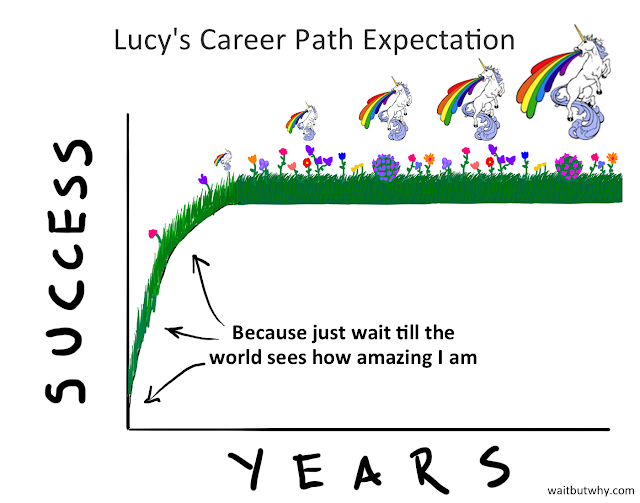
Unfortunately, the funny thing about the world is that it turns out to not be that easy of a place, and the weird thing about careers is that they’re actually quite hard. Great careers take years of blood, sweat and tears to build—even the ones with no flowers or unicorns on them—and even the most successful people are rarely doing anything that great in their early or mid-20s.
不幸的是,世界上有趣的事實是,這個地方其實並不容易,而職業的奇特之處在於,它們實際上相當艱難。偉大的職業需要多年來的血汗與淚水來建立——即使是那些沒有花朵或獨角獸的職業——而即使是最成功的人,在他們的二十多歲早期或中期,通常也不會做出什麼特別偉大的成就。
But GYPSYs aren’t about to just accept that.
但吉普賽人可不會輕易接受這一點。
Paul Harvey, a University of New Hampshire professor and GYPSY expert, has researched this, finding that Gen Y has “unrealistic expectations and a strong resistance toward accepting negative feedback,” and “an inflated view of oneself.” He says that “a great source of frustration for people with a strong sense of entitlement is unmet expectations. They often feel entitled to a level of respect and rewards that aren’t in line with their actual ability and effort levels, and so they might not get the level of respect and rewards they are expecting.”
保羅·哈維,新罕布什爾大學的教授及吉普賽專家,對此進行了研究,發現 Y 世代有著「不切實際的期望和對負面反饋的強烈抵抗」,以及「對自我的過度膨脹」。他指出,「對於那些擁有強烈權利感的人來說,未能滿足的期望常常是他們最大的挫折來源。他們經常感到自己理應獲得與其實際能力和努力水平不相符的尊重和獎勵,因此可能無法得到他們所期待的尊重和獎勵。」
For those hiring members of Gen Y, Harvey suggests asking the interview question, “Do you feel you are generally superior to your coworkers/classmates/etc., and if so, why?” He says that “if the candidate answers yes to the first part but struggles with the ‘why,’ there may be an entitlement issue. This is because entitlement perceptions are often based on an unfounded sense of superiority and deservingness. They’ve been led to believe, perhaps through overzealous self-esteem building exercises in their youth, that they are somehow special but often lack any real justification for this belief.”
對於招聘 Y 世代成員,哈維建議在面試中問這個問題:“你是否覺得自己通常優於同事或同學等?如果是,為什麼?”他表示:“如果候選人在第一部分回答‘是’,但在‘為什麼’上卻表現得很掙扎,那麼可能存在權利感的問題。這是因為權利感的認知往往源於一種無根據的優越感和應得感。他們可能被引導相信,或許是因為年輕時期過度強調自尊心的練習,讓他們覺得自己是特別的,但實際上卻缺乏任何真正的理由來支持這種信念。”
And since the real world has the nerve to consider merit a factor, a few years out of college Lucy finds herself here:
由於現實世界敢於將能力視為一個考量因素,露西在大學畢業幾年後發現自己來到了這裡:
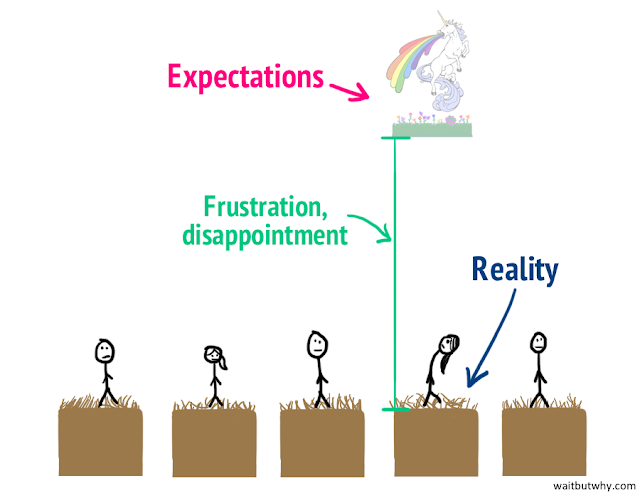
Lucy’s extreme ambition, coupled with the arrogance that comes along with being a bit deluded about one’s own self-worth, has left her with huge expectations for even the early years out of college. And her reality pales in comparison to those expectations, leaving her “reality – expectations” happy score coming out at a negative.
露西的極端野心,加上對自己價值的錯誤認知所帶來的傲慢,使她對大學畢業後的早期生活抱有過高的期望。然而,她的現實與這些期望相比顯得黯然失色,導致她的“現實 - 期望”快樂指數變成負數。
And it gets even worse. On top of all this, GYPSYs have an extra problem that applies to their whole generation:
而且情況變得更加糟糕。除了這些,吉普賽人還面臨一個影響整個世代的額外問題:
GYPSYs Are Taunted 吉普賽人被嘲笑
Sure, some people from Lucy’s parents’ high school or college classes ended up more successful than her parents did. And while they may have heard about some of it from time to time through the grapevine, for the most part they didn’t really know what was going on in too many other peoples’ careers.
當然,露西父母的高中或大學同學中,有些人最終比她的父母更成功。雖然他們偶爾會透過小道消息聽到一些情況,但大多數時候,他們並不真正了解其他人的職業生涯。
Lucy, on the other hand, finds herself constantly taunted by a modern phenomenon: Facebook Image Crafting.
露西則不斷受到一種現代現象的嘲諷:Facebook 圖片塑造。
Social media creates a world for Lucy where A) what everyone else is doing is very out in the open, B) most people present an inflated version of their own existence, and C) the people who chime in the most about their careers are usually those whose careers (or relationships) are going the best, while struggling people tend not to broadcast their situation. This leaves Lucy feeling, incorrectly, like everyone else is doing really well, only adding to her misery:
社交媒體為露西創造了一個世界,在這個世界裡,A) 每個人所做的事情都非常公開,B) 大多數人都會誇大自己生活的美好,C) 最常談論自己職業的人通常是那些職業(或感情)最順利的人,而那些面臨困難的人則不會公開自己的情況。這讓露西感到錯誤地認為其他人都過得很好,進一步加重了她的痛苦:
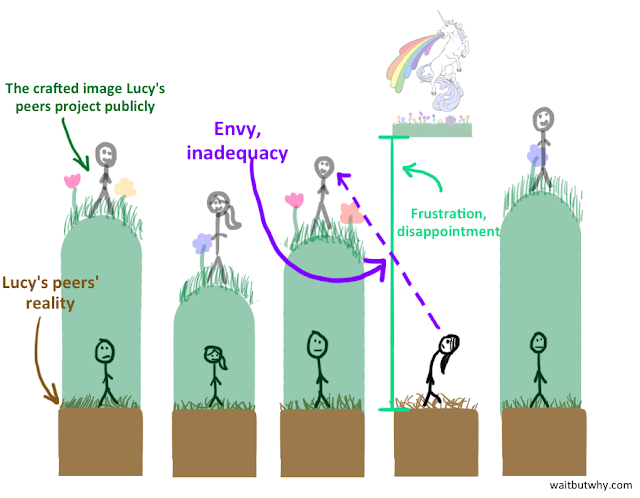
So that’s why Lucy is unhappy, or at the least, feeling a bit frustrated and inadequate. In fact, she’s probably started off her career perfectly well, but to her, it feels very disappointing.
所以這就是露西不快樂的原因,或者至少她感到有些沮喪和不自信。事實上,她的職業生涯起步得相當順利,但對她來說,這一切卻讓她感到非常失望。
Here’s my advice for Lucy:
這是我給露西的建議:
1) Stay wildly ambitious. The current world is bubbling with opportunity for an ambitious person to find flowery, fulfilling success. The specific direction may be unclear, but it’ll work itself out—just dive in somewhere.
保持強烈的雄心。當前的世界充滿了機會,讓有雄心的人能夠找到多姿多彩、充實的成功。雖然具體的方向可能不太明確,但這會自然而然地解決——只需在某個地方開始行動。
2) Stop thinking that you’re special. The fact is, right now, you’re not special. You’re another completely inexperienced young person who doesn’t have all that much to offer yet. You can become special by working really hard for a long time.
停止認為自己是特別的。事實上,現在的你並不特別。你只是一位完全沒有經驗的年輕人,還沒有太多可以貢獻的東西。你可以透過長時間的努力工作來變得特別。
3) Ignore everyone else. Other people’s grass seeming greener is no new concept, but in today’s image crafting world, other people’s grass looks like a glorious meadow. The truth is that everyone else is just as indecisive, self-doubting, and frustrated as you are, and if you just do your thing, you’ll never have any reason to envy others.
3) 忽視他人。別人的草看起來更綠這個概念並不新鮮,但在當今這個形象塑造的世界裡,別人的草彷彿是一片美麗的草地。事實上,其他人和你一樣猶豫不決、自我懷疑和沮喪。如果你專注於自己,你就不會有理由去羨慕他人。
_______
If you like Wait But Why, sign up for our email list and we’ll send you new posts when they come out.
如果你喜歡《等一下,但為什麼》,請訂閱我們的電子郵件列表,我們會在新文章發布時通知你。
To support Wait But Why, visit our Patreon page.
為了支持《等一下,但為什麼》,請前往我們的 Patreon 頁面。
_________
If you liked this, check out:
如果你喜歡這個,請參考以下內容:
Why Procrastinators Procrastinate
拖延者為何會拖延
How to Pick Your Life Partner
如何挑選你的生活伴侶
7 Ways to Be Insufferable on Facebook
在 Facebook 上讓人無法忍受的 7 種方式

